
Qinghong Yang
Program Overview: A Multi-Dimensional Curriculum Empowering Belt and Road Leaders
Moderator Kan Cai provided a comprehensive overview of the BRI EMBA program, detailing its positioning, curriculum design, and unique resources. The program combines core modules—such as Belt and Road financial cooperation, cross-border investment, and global risk management—with a practical, multi-layered learning model: policy interpretation + corporate visits + case studies. This approach bridges theory and practice, equipping executives to lead effectively in dynamic markets.
The BRI EMBA leverages Tsinghua University and PBC School of Finance’s top-tier faculty, supplemented by regular lectures from policymakers and industry leaders. Students engage with leading domestic and international enterprises and collaborate across industries and regions, forming a global alumni network that supports long-term career advancement. During the Q&A session, participants actively raised questions on course suitability and time management, which were addressed in detail by the moderator.

Kan Cai
Alumni Voices: Immersive Learning Experiences as New Milestones in Life and Career
The forum featured a dedicated alumni sharing session, where both past and current students recounted their experiences with the BRI EMBA program, resonating strongly with attendees.
Kaveh Tz Toe Wong, alumnus of the second cohort and Founder & CTO of Curine Ventures and Sanggul Emas Pte. Ltd., reflected on his key takeaways: “The collision of cases from different industries completely shattered my previous cognitive boundaries.” He emphasized that under the Belt and Road cooperation framework, technology managers need not only deep vertical expertise but also a broad horizontal ecosystem perspective. The program’s diversified curriculum and cross-industry peer interactions provide fertile ground for this dual advancement.

Kaveh Tz Toe Wong
Amir Mourali, a newly enrolled student of the seventh cohort from Wuthelam Holdings Pte Ltd., shared his fresh “opening experience”: “The multidisciplinary, cutting-edge opening courses, covering professional introductions and industry trend analyses, instantly ignited my curiosity. Outdoor team-building and collaborative assignments quickly broke the initial barriers, fostering trust through shared growth.” He described the experience as “deep in content, warm in interaction” and noted that his sense of belonging at Tsinghua continues to strengthen through engagement with classmates.

Amir Mourali
Fernando Scodro, alumnus of the fifth cohort, added from a long-term value perspective: “Participating in this program allows you to listen to top scholars’ deep interpretations of frontier research, engage in thought-provoking dialogue with policymakers, and visit benchmark innovative enterprises. Coupled with diverse course activities and in-depth connections with outstanding peers from home and abroad, these immersive learning experiences have become significant new milestones in my life journey.”

Fernando Scodro
Global Reach Rooted in China: Building an Educational Bridge for Belt and Road Cooperation
As the Belt and Road Initiative continues to advance, the global economic landscape is undergoing new adjustments and opportunities. As China’s leading financial education program, the Tsinghua BRI EMBA is committed to cultivating cross-disciplinary financial and management talent for Belt and Road cooperation through high-quality education, cross-regional resource integration, and the construction of a global ecosystem.
The successful Singapore recruitment forum not only allowed local elites to gain in-depth insights into the program’s advantages but also established an educational bridge between China, Singapore, and the broader Southeast Asia region within the Belt and Road framework. Looking ahead, Tsinghua University PBC School of Finance will continue to deepen international exchanges, promote more cross-regional cooperation outcomes, and contribute greater educational value to the high-quality development of the Belt and Road Initiative.